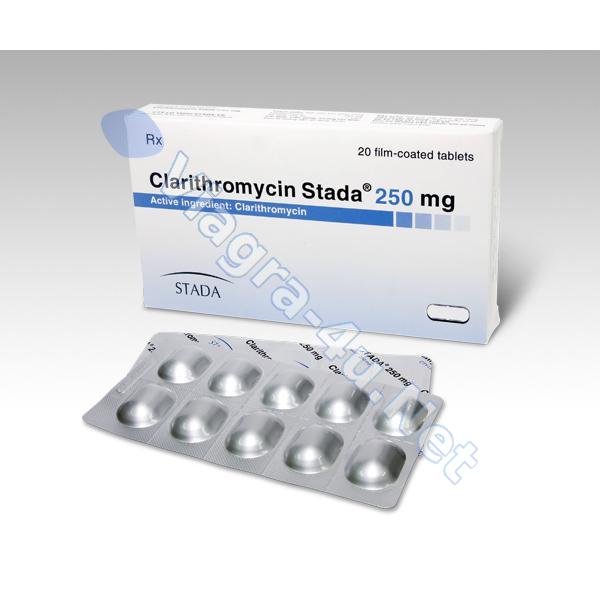

La clarithromycine est un antibiotique macrolide utilisé pour traiter les pharyngites, les angines, les sinusites aiguës maxillaires, en association avec d'autres antibiotiques pour traiter l'infection à Helicobacter pylori, les complications bactériennes aiguës de la bronchite chronique, les pneumonies, les infections cutanées.
Clarithromycin, sold under the brand name Biaxin, is an antibiotic used to treat various bacterial infections.
This includes strep throat, pneumonia, skin infections, H. pylori infection, and Lyme disease, among others. Clarithromycin can be taken by mouth as a pill or liquid.
How to use Biaxin:
Use Biaxin as directed by your doctor. Check the label on the medicine for exact dosing instructions.
- Take Biaxin by mouth with or without food.
- Biaxin works best if it is taken at the same time each day.
- Continue to take Biaxin even if you feel well. Do not miss any doses.
- Do not miss any doses. If you miss a dose of Biaxin , take it as soon as possible. If it is almost time for your next dose, skip the missed dose and go back to your regular dosing schedule. Do not take 2 doses at once.
Ask your health care provider any questions you may have about how to use Biaxin.
Important safety information about Biaxin:
- Contact your doctor right away if stomach pain or cramps, severe diarrhea, or bloody stools occur. Do not treat diarrhea without first checking with your doctor.
- Biaxin only works against bacteria; it does not treat viral infections (eg, the common cold).
- Long-term or repeated use of Biaxin may cause a second infection. Tell your doctor if signs of a second infection occur. Your medicine may need to be changed to treat this.
- Be sure to use Biaxin for the full course of treatment. If you do not, the medicine may not clear up your infection completely. The bacteria could also become less sensitive to this or other medicines. This could make the infection harder to treat in the future.
- Lab tests, including complete blood counts, may be performed while you use Biaxin . These tests may be used to monitor your condition or check for side effects. Be sure to keep all doctor and lab appointments.
- Biaxin should not be used in CHILDREN younger than 6 months old; safety and effectiveness in these children have not been confirmed.
- PREGNANCY and BREAST-FEEDING: This medicine has been shown to cause harm to the fetus. Biaxin is not recommended for use during pregnancy except when no other antibiotics can be used. If you think you may be pregnant, contact your doctor. You will need to discuss the benefits and risks of using Biaxin while you are pregnant. It is not known if Biaxin is found in breast milk. If you are or will be breast-feeding while you use Biaxin , check with your doctor. Discuss any possible risks to your baby.
Do NOT use Biaxin if:
- you are allergic to any ingredient in Biaxin or any other macrolide (eg, erythromycin)
- you are taking cisapride, cyclosporine, dofetilide, eletriptan, ergot alkaloids (eg, ergotamine, dihydroergotamine), H1 antagonists (eg, terfenadine, astemizole), pimozide, QT-prolonging agents (eg, quinidine, sotalol, thioridazine), quinolones (eg, ciprofloxacin), or sumatriptan
Contact your doctor or health care provider right away if any of these apply to you.
Before using Biaxin:
Some medical conditions may interact with Biaxin.
Tell your doctor or pharmacist if you have any medical conditions, especially if any of the following apply to you:
- if you are pregnant, planning to become pregnant, or are breast-feeding
- if you are taking any prescription or nonprescription medicine, herbal preparation, or dietary supplement
- if you have allergies to medicines, foods, or other substances
- if you have diarrhea, a stomach infection, a blood disorder, severe kidney problems, or liver problems
Some MEDICINES MAY INTERACT with Biaxin. Tell your health care provider if you are taking any other medicines, especially any of the following:
- Rifampin because it may decrease Biaxin's effectiveness
- Dofetilide, macrolides and ketolides (eg, erythromycin, azithromycin), pimozide, QT-prolonging agents (eg, quinidine, sotalol, thioridazine), quinolones (eg, ciprofloxacin), or streptogramins (eg, mikamycin) because serious, possibly life-threatening side effects on the heart or irregular heartbeat may occur
- Anticoagulants (eg, warfarin), aldosterone blockers (eg, spironolactone), benzodiazepines (eg, alprazolam), buspirone, carbamazepine, cilostazol, cisapride, colchicine, corticosteroids (eg, hydrocortisone), cyclosporine, digoxin, disopyramide, eletriptan, ergot alkaloids (eg, ergotamine, dihydroergotamine), H1 antagonists (eg, terfenadine, astemizole), HMG-CoA reductase inhibitors (eg, simvastatin), imatinib, macrolide immunosuppressants (eg, tacrolimus), macrolides and ketolides (eg, erythromycin, azithromycin), phosphodiesterase type-5 inhibitors (eg, sildenafil), rifampin, sumatriptan, theophyllines, or verapamil because the actions and side effects of these medicines may be increased
This may not be a complete list of all interactions that may occur. Ask your health care provider if Biaxin may interact with other medicines that you take. Check with your health care provider before you start, stop, or change the dose of any medicine.
Possible side effects of Biaxin:
All medicines may cause side effects, but many people have no, or minor, side effects. Check with your doctor if any of these most COMMON side effects persist or become bothersome:
- Abnormal taste; diarrhea; headache; indigestion; nausea; stomach discomfort; vomiting.
Seek medical attention right away if any of these SEVERE side effects occur:
- Severe allergic reactions (rash; hives; itching; difficulty breathing; tightness in the chest; swelling of the mouth, face, lips, or tongue); bloody stools; confusion; decreased urination; depression; emotional or mood changes; hallucinations; nightmares; severe diarrhea; severe stomach pain/cramps; trouble sleeping.
This is not a complete list of all side effects that may occur. If you have questions or need medical advice about side effects, contact your doctor or health care provider.
Proper storage of Biaxin:
Store Biaxin at room temperature between 68 and 77 degrees F (20 and 25 degrees C) in a well-closed container. Store away from light, heat, and moisture. Do not store in the bathroom. Keep Biaxin out of the reach of children and away from pets.